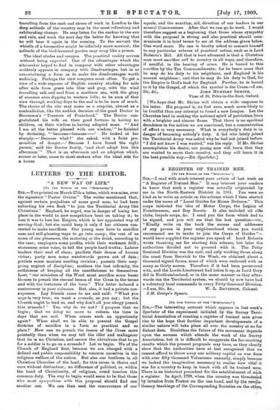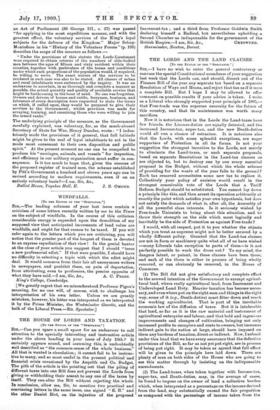[TO TOR Kama or Tits "sparrATort.'] Sia,—The interesting account which
appears in last week's Spectator of the experiment initiated by the Surrey Terri- torial Association of creating a register of trained men gives rise to the hope that further important developments of a similar nature will take place all over the country at no far distant date. Doubtless the future of the Movement depends upon the success which attends the work of the -Surrey Association, but it is difficult to exaggerate the far-reaching results which the present proposals may have, as they Clearly show that the authorities have at last recognised that we cannot afford to throw away our military capital as was done with over fifty thousand Volunteers annually, simply becalse we lacked the imagination necessary to realise how vital it was for a country to keep in touch with all its trained 'Men. There is an historical precedent for the establishment of stich a register.' In April, 1798, when the country was threatected by invasion from France on the one hand, and by the revolu.
tionary teachings of the corresponding Societies on the other, an Act of Parliament (38 George III., c. 27) was passed "for applying in the most expeditious manner, and with the greatest effect, the voluntary services of the King's loyal subjects for the defence of the Kingdom." Major Sebag- Montefiore in his "History of the Volunteer Forces" (p. 189) describes the scope of the measure as follows :—
" Under the provisions of this statute the Lords-Lieutenant were required to obtain returns of the numbers of able-bodied men between the ages of fifteen and sixty resident within their counties, together with particulars of the terms and conditions under which such proportions of the population would, if required, be willing to serve. The exact nature of the services to be rendered in each case was also to be stated. All classes of urban and rural inhabitants were embraced by the inquiry. It was an endeavour to ascertain, in as thorough and complete a manner as possible, the actual quantity and quality of available service that might be forthcoming in the hour of need. No one was forgotten. Owners and drivers of horses and cattle, ferrymen, boatmen, and labourers of every description were requested to state the terms on which, if called upon, they would be prepared to give their services to the Government ; whilst provision was made for arraying training, and exercising those who were willing to join the armed ranks."
The underlying principle of the measure, as the Government carefully explained, was voluntary, for, as the much-abused Secretary of State for War, Henry Dundru3, wrote : "I indus- triously made the provisions of it general, that full latitude might be given to the zeal of loyal inhabitants to act in the mode most consonant to their own disposition and public spirit." At the present moment no one can be compelled to .produce his "carriages, animals, and vessels" for inspection, and efficiency in our military organisation must suffer in con- sequence. Is it too much to hope that, given the success of the proposed register of trained men, the scheme established by Pitt's Government a hundred and eleven years ago can be revived according to modern requirements, even if on an entirely voluntary basis P—I am. Sir, &c.,









































 Previous page
Previous page